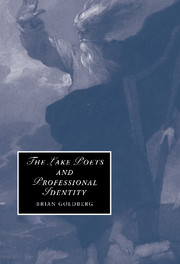Book contents
- Frontmatter
- Contents
- Acknowledgments
- Introduction: Professionalism and the Lake School of Poetry
- Part I Romanticism, risk, and professionalism
- Part II Genealogies of the romantic wanderer
- Part III Romantic itinerants
- Part IV The Lake school, professionalism, and the public
- 6 Robert Southey and the claims of literature
- 7 “Ministry more palpable”: William Wordsworth's romantic professionalism
- Notes
- Bibliography
- Index
6 - Robert Southey and the claims of literature
Published online by Cambridge University Press: 14 January 2010
- Frontmatter
- Contents
- Acknowledgments
- Introduction: Professionalism and the Lake School of Poetry
- Part I Romanticism, risk, and professionalism
- Part II Genealogies of the romantic wanderer
- Part III Romantic itinerants
- Part IV The Lake school, professionalism, and the public
- 6 Robert Southey and the claims of literature
- 7 “Ministry more palpable”: William Wordsworth's romantic professionalism
- Notes
- Bibliography
- Index
Summary
The talk of ministering to the higher wants and more refined pleasures of the species, being both more dignified and more agreeable than that of supplying their vulgar necessities, multitudes are induced to undertake [literature] without any great preparation; and the substantial business of life is defrauded of much valuable labour, while the elegant arts are injured by a crowd of injudicious pretenders … Shoemakers and tailors astonish the world with plans for reforming the constitution, and with effusions of relative and social feeling.
– The Edinburgh Review, April, 1803In 1802, Southey engaged in a brief but intense feud with the Reverend Herbert Croft over a group of letters written by Thomas Chatterton. Croft and Chatterton represented two divergent, even opposite, attitudes toward authorship, and the feud gave Southey the opportunity to articulate his most progressive version of poetic professionalism. Croft, an Anglican priest and man-of-letters, combined entrepreneurial literary endeavors with an ongoing (if perpetually frustrated) search for preferment within the Church. In addition to the biography of Young discussed in Chapter 1, his literary projects included a never-completed revision of Samuel Johnson's dictionary, a “tract against treason” sparked by the Gordon Riots, and an epistolary novel, Love and Madness, that detailed a widely known love affair which ended in murder. An impoverished baronet as well as a priest and dependent on the support of a genteel readership, he was the type and form of the establishment writer.
- Type
- Chapter
- Information
- The Lake Poets and Professional Identity , pp. 193 - 214Publisher: Cambridge University PressPrint publication year: 2007



